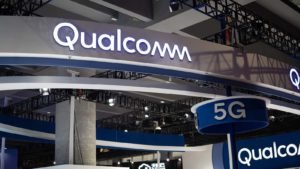To say that consumers have adopted the smartphone would be an understatement: in 2020 about 1.38 billion smartphones were sold worldwide. In the U.S. alone there are more than 260 million smartphone users. That figure indicates that penetration rates have eclipsed 80% in the U.S. And there is plenty of money being made by tech stocks when counted as revenue from smartphone sales. In fact, annual sales now exceed $70 billion.
Those figures leave investors extremely curious about the potential of stocks within the sector. Indeed, investors can view the sector from several angles. This article will primarily look at the companies behind the physical product consumers receive, i.e., the actual smartphone itself.
What follows is a list of seven strong companies to consider investing in as our collective demand for smartphones shows few signs of waning. They are:
- Taiwan Semiconductor Manufacturing Corp. (NYSE:TSM)
- Apple (NASDAQ:AAPL)
- Ericsson (NYSE:ERIC)
- Micron Technology (NASDAQ:MU)
- MagnaChip Semiconductor (NYSE:MX)
- Qorvo (NASDAQ:QRVO)
- Qualcomm (NASDAQ:QCOM)
Tech Stocks: Taiwan Semiconductor (TSM)
Contents

Source: Sundry Photography / Shutterstock.com
Taiwan Semiconductor Manufacturing Corp. is a company any investor interested in semiconductors and smartphones should know about. The company is integral to both of those industries. In fact, I’d go so far as to say that TSMC is a company everyone should know about. That’s because it is the world’s leading semiconductor foundry.
A foundry is simply a manufacturer which supplies semiconductors to companies that outsource their designed chips. And semiconductors are in everything. TSMC manufactured 10,761 products for 499 customers in 2019. But I digress.
TSMC manufactures 5nm chips which are becoming increasingly important. Revenues for 5 nm chips have taken off in the past two quarters. TSMC manufactures the Apple A14 Bionic. That chip is used in the iPhone 12 and the iPad Air 2020.
And TSMC has recently become even more important as there is an ongoing semiconductor shortage. As a result, TSMC is in an extremely strong position. TSMC’s monthly revenues are rising quickly. In January the company saw revenue rise 22.2% year-over-year. And in February revenue increased by 14.1% YoY. As far as plays on smartphones go, TSM stock is a very smart bet.
Apple (AAPL)

Source: Hadrian / Shutterstock.com
It’s only right to write about Apple when discussing demand for smartphones. According to livemint.com, Apple makes 5 out of the 10 most sold phones of 2020. Although Apple is clearly a strong company, it is in a bit of a strange place.
Apple had a huge first quarter. Back in late January the company posted record quarterly earnings. Revenues hit an all-time high of $111.4 billion and earnings were $1.68 per share representing a 35% increase.
But AAPL stock is down nevertheless. In fact, Apple shares have lost about 16% of their value since late January. There is a general sentiment that perhaps Apple had run out of steam. After all, how can it beat its incredible Q1 results? Further, Apple didn’t provide clear revenue guidance for the coming quarter citing the pandemic as the reason.
The situation represents an obvious buy-the-dip opportunity.
As an investor I’d ask myself this question: is Apple likely to continue to grow, or not? I side with more bullish opinions about Apple as a current buy-the-dip target. Among those voices are Jefferies analyst Kyle McNealy, who stated “We think the Street still underappreciates Apple’s opportunity with 5G, in our view, there’s much more to come as we’re only in the initial innings of Apple’s 5G adoption cycle.”
Ericsson (ERIC)

Source: rafapress / Shutterstock.com
Let’s switch gears from chips and smartphone manufacturers to another massive narrative in smartphones: 5G. Specifically, let’s look at the buildout of the 5G networks. That’s where Ericsson figures prominently in relation to the conversation around smartphone demand.
Ericsson is currently engaged in a pitched battle with Huawei and Nokia (NYSE:NOK) to establish commercial agreements with 5G operators across the globe. Back in August of 2020, Ericsson announced it had secured its 100th 5G commercial agreement with unique service providers. At that time it also operated 56 live global networks.
Huawei is leading the race to secure network contracts but it faces pressure from governments around the globe. Governments worry the Chinese company will use its 5G equipment to spy on other countries. The U.S. Department of Justice case against Huawei has cast light upon the Chinese company and global governments are clearly worried as well. As a result, Huawei is now banned from several countries. This opened the door for Ericsson and Nokia.
Ericsson’s most recent count is 131 5G commercial contracts and 79 live networks. Nokia, on the other hand, has 146 commercial 5G deals and 55 live networks. Huawei is far and away the leader though. It has signed more than 1,000 corporate 5G contracts. All three of these companies sit within Gartner’s Magic Quadrant, which highlights leaders within specific industries.
So why consider Ericsson over Huawei or Nokia? The answer to that question is simple: Ericsson is much better regarded on Wall Street and Huawei isn’t a publicly traded company.
Tech Stocks: Micron Technology (MU)

Source: Valeriya Zankovych / Shutterstock.com
Micron Technology is another semiconductor manufacturer on this list. The company’s solutions span multiple industries including 5G and Mobile. Micron, like most smartphone chip manufacturers, focuses on efficient chips which minimize power consumption while enabling high-speed data.
It has a few interesting projects for mobile as an end market. Micron is addressing the high-end mobile market with its 176 layer NAND. 176 layer NAND features 2X more efficiency than its previous 96 layer NAND as well as doubled write performance. This means that Micron’s chips have utility in smartphones which require better specs to power their operation.
Q1 mobile revenue was up YoY for Micron. The company has transitioned away from Huawei to other mobile customers during the quarter. Micron’s Mobile Business Unit is its second largest behind Compute and Networking. Mobile accounts for roughly 25% of revenues.
MagnaChip Semiconductor (MX)

Source: apichon_tee/ShutterStock.com
MagnaChip Semiconductors designs and manufactures chipsets applicable to many technologies. Within mobile, MagnaChip has both power and display solutions. MagnaChip’s OLED Display Driver Integrated Circuits (DDICs) allow mobile innovation. This technology produces high resolution pictures on mobile devices and allows for foldable, flexible, and even rollable screens. MagnaChip also provides multiple mobile power solutions for smartphones.
MagnaChip reported Q4 revenues of $142.9 million, which represented a 15.9% YoY increase. OLED DDIC revenue amounted to $80.4 million of that $142.9 million during the quarter. The $80.4 million OLED DDICs was a new quarterly record, and an increase of 19.4% YoY.
OLED DDIC displays provide 1440 X 3360 resolution and MagnaChip is entering full scale production after the encouraging results. The displays will be integrated into 5G phones. The company expects 5G phone shipments to grow from 220 million units in 2020 to 1.15 billion units in 2023 based on market research from Omdia.
Qorvo (QRVO)
Source: Shutterstock
Qorvo is yet another semiconductor company which has seen a fair amount of success lately. The company has recorded EPS earnings beats in each of the past four quarters. That said, it isn’t an outright “buy” according to Wall Street. Instead, it maintains an “overweight” status based on the opinions of the analysts covering the stock.
Qorvo saw both revenues and profits rise during the last three quarters of 2020 when compared to the same period in 2019. Revenues increased by 20.44%, while net income increased by 54.57%. That indicates that Qorvo is operationally efficient. And increased sales translate to an even larger increase in net income.
Qorvo is a supplier to Apple. According to a recent Barron’s article, Qorvo may be more important than ever. Qorvo makes RF (radio frequency) chips that help phones connect to wireless networks and the internet. A Barclay’s analyst recently disregarded indications that the iPhone mini may see a 20% reduction in orders. The analyst issued a note countering that notion, and as a result Qorvo shares rose.
Tech Stocks: Qualcomm (QCOM)

Source: Xixi Fu / Shutterstock.com
Qualcomm is relying on its Snapdragon mobile platform to drive revenues in the mobile sector. It is marketing the platform to OEMs highlighting its utility in computer vision, camera features and machine intelligence. Qualcomm is particularly aiming at mobile gaming with its Snapdragon platform. The entire platform can be viewed here. Qualcomm is aiming at the intersection of AI, graphics, gaming and all of the leading smartphone features consumers are demanding out of the latest handsets.
Qualcomm anticipates high single-digit growth in 5G handset shipments in 2021. It estimates that it will ship 450 million to 550 million units in fiscal year 2021. Qualcomm also saw a big jump from Q1 2020 to Q1 2021 on both a net income and EBITDA basis. Net income increased from $925 million to $2.455 billion during that period, while EBITDA more than doubled.
Qualcomm is separated into three distinct business segments including QCT (CDMA technologies), QTL (technology licensing), and QSI (strategic initiatives). The QCT sector accounts for roughly 3X the revenues of the QTL sector while QSI is an outlay of capital for investment initiatives.
On the date of publication, Alex Sirois did not have (either directly or indirectly) any positions in the securities mentioned in this article.
Alex Sirois is a freelance contributor to InvestorPlace whose personal stock investing style is focused on long-term, buy-and-hold, wealth-building stock picks. Having worked in several industries from e-commerce to translation to education and utilizing his MBA from George Washington University, he brings a diverse set of skills through which he filters his writing.


